
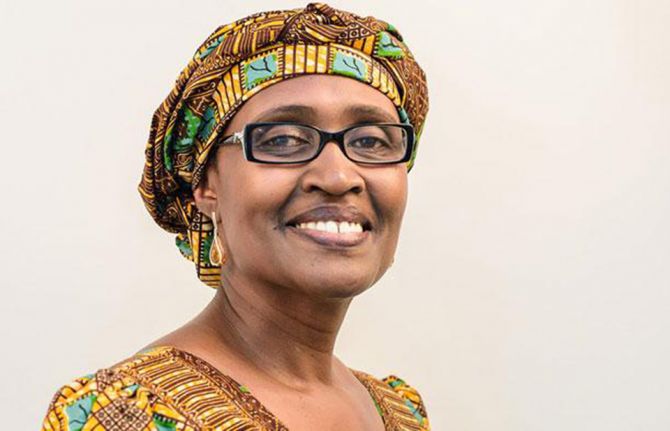
Press Statement
UNAIDS welcomes the appointment of Winnie Byanyima as its new Executive Director
14 August 2019 14 August 2019GENEVA, 14 August 2019—UNAIDS warmly welcomes the appointment of Winnie Byanyima as its new Executive Director. Ms Byanyima has more than 30 years of experience in political leadership, diplomacy and humanitarian engagement.
“I am honoured to be joining UNAIDS as the Executive Director at such a critical time in the response to HIV,” said Ms Byanyima. “The end of AIDS as a public health threat by 2030 is a goal that is within the world’s reach, but I do not underestimate the scale of the challenge ahead. Working with all its partners, UNAIDS must continue to speak up for the people left behind and champion human rights as the only way to end the epidemic.”
The United Nations Secretary-General, António Guterres, appointed Ms Byanyima as the UNAIDS Executive Director and United Nations Under-Secretary-General following a comprehensive selection process that involved a search committee constituted by members of the UNAIDS Programme Coordinating Board. The UNAIDS Committee of Cosponsoring Organizations made the final recommendation on the appointment to the Secretary-General.
Ms Byanyima brings a wealth of experience and commitment in harnessing the power of governments, multilateral agencies, the private sector and civil society to end the AIDS epidemic around the world. Ms Byanyima has been the Executive Director of Oxfam International since 2013. Prior to that, she served for seven years as the Director of Gender and Development at the United Nations Development Programme.
Ms Byanyima began her career as a champion of marginalized communities and women 30 years ago as a member of parliament in the National Assembly of Uganda. In 2004, she became the Director of Women and Development at the African Union Commission, working on the Protocol on the Rights of Women in Africa, an international human rights instrument that became an important tool for reducing the disproportionate effect of HIV on the lives of women in Africa.
She holds an advanced degree in mechanical engineering (in energy conservation and the environment) from the Cranfield Institute of Technology and an undergraduate degree in aeronautical engineering from the University of Manchester.
The Secretary-General wishes to extend his appreciation and gratitude to the UNAIDS Deputy Executive Director, Management and Governance, Gunilla Carlsson, for her service as the Executive Director, a.i.
UNAIDS
The Joint United Nations Programme on HIV/AIDS (UNAIDS) leads and inspires the world to achieve its shared vision of zero new HIV infections, zero discrimination and zero AIDS-related deaths. UNAIDS unites the efforts of 11 UN organizations—UNHCR, UNICEF, WFP, UNDP, UNFPA, UNODC, UN Women, ILO, UNESCO, WHO and the World Bank—and works closely with global and national partners towards ending the AIDS epidemic by 2030 as part of the Sustainable Development Goals. Learn more at unaids.org and connect with us on Facebook, Twitter, Instagram and YouTube.

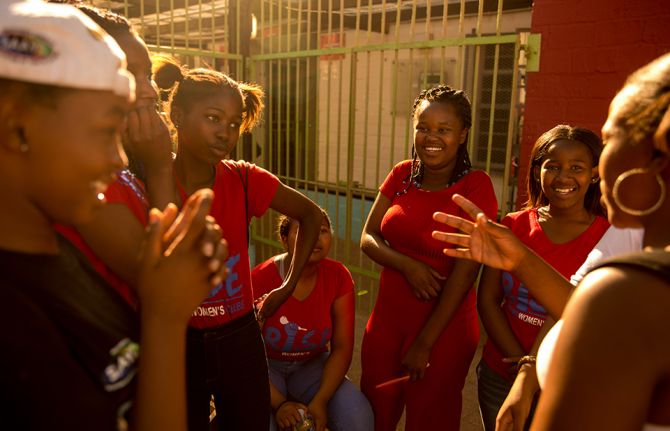
Press Statement
UNAIDS welcomes important study results which find no significant difference in HIV risk among three highly effective contraceptive methods
14 June 2019 14 June 2019UNAIDS also calls for urgent action to integrate full HIV combination prevention with sexual and reproductive health services as study finds extremely high HIV incidence among women
GENEVA, 14 June 2019—UNAIDS welcomes new results from the Evidence for Contraceptive Options and HIV Outcomes (ECHO) study showing that there is no significant difference in risk of HIV infection among three highly effective contraceptive methods. The large-scale study, conducted in Eswatini, Kenya, South Africa and Zambia, examined the risk of HIV acquisition when using an injectable contraceptive, an implant inserted under the skin and a copper-releasing intrauterine device.
The ECHO study was conducted as part of efforts to collect better data following a number of observational studies which suggested a possible increased risk of HIV acquisition for women using progestogen-only injectable contraception. “These results are of critical importance to women in areas with high prevalence of HIV,” said Gunilla Carlsson, UNAIDS Executive Director, a.i.. “They give women and girls the information they need to make informed decisions over the choice of contraception methods available to them.”
However, the study also shines a spotlight on the severe impact that HIV is having on women and girls in eastern and southern Africa. It found extremely high incidence of HIV infections among the women participating in the trial—an average of 3.8% per year—incidence was even higher among young women below the age of 25.
“Finding such high rates of new infections among young women through this study is deeply disturbing,” said Ms Carlsson. “It shows that despite conscious efforts to integrate family planning and HIV services to date, we are clearly not getting it done in a way or to the extent needed to really support women to protect themselves from HIV. Focused combination HIV prevention efforts must be urgently integrated and intensified within sexual and reproductive health services, particularly in eastern and southern Africa, to stop women from becoming infected with HIV.”
Integrating HIV prevention within contraceptive and other sexual and reproductive health services in high prevalence settings includes offering HIV literacy, testing, linkage to antiretroviral therapy for people testing HIV-positive, partner testing, condom promotion and pre-exposure prophylaxis to protect against HIV. It should include linking women with particularly high risk to broader social and economic support.
Ensuring that young women are able to access a broad range of effective contraceptive methods and have the tools to protect themselves from HIV will help to ensure that women have agency over their own sexual and reproductive health and rights.
Following the new study results the World Health Organization will convene a Guideline Development Group to review its existing recommendations concerning women’s eligibility for using various contraceptive methods if they are at high risk of HIV. Updated recommendations are expected by the end of August 2019.
UNAIDS
The Joint United Nations Programme on HIV/AIDS (UNAIDS) leads and inspires the world to achieve its shared vision of zero new HIV infections, zero discrimination and zero AIDS-related deaths. UNAIDS unites the efforts of 11 UN organizations—UNHCR, UNICEF, WFP, UNDP, UNFPA, UNODC, UN Women, ILO, UNESCO, WHO and the World Bank—and works closely with global and national partners towards ending the AIDS epidemic by 2030 as part of the Sustainable Development Goals. Learn more at unaids.org and connect with us on Facebook, Twitter, Instagram and YouTube.
Contact
UNAIDS GenevaSophie Barton-Knott
tel. +41 22 791 1697
bartonknotts@unaids.org
UNAIDS Media
tel. +41 22 791 42 37
communications@unaids.org
Joint statement
Press centre
Download the printable version (PDF)


Press Statement
UNAIDS welcomes the decision of the Constitutional Court of Colombia to strike down the section of the criminal code criminalizing HIV transmission
13 June 2019 13 June 2019GENEVA, 13 June 2019—UNAIDS welcomes the decision of the Constitutional Court of Colombia to remove the section of the criminal code that criminalizes HIV and Hepatitis B transmission. Overly broad criminalization of HIV transmission is ineffective, discriminatory and does not support efforts to prevent new HIV infections.
“Public health goals cannot be pursued by denying people their individual rights. The decision by the Constitutional Court of Colombia is a concrete step to ensure the law works for the HIV response, and not against it,” said Gunilla Carlsson, UNAIDS Executive Director, a.i. “UNAIDS will continue to advocate for a protective legal environment and the removal of punitive laws, policies, practices, stigma and discrimination that block effective responses to HIV.”
The Constitutional Court of Colombia established that the law violated the principles of equality and non-discrimination, as it singled out people living with HIV, stigmatising them and limiting their rights. The Court established that the law created a differential treatment that is not reasonable —and therefore constituted discrimination. The Court further established that such law violated the sexual rights of people living with HIV and it was ineffective to meet any public health objectives.
Overly broad and inappropriate application of criminal law against people living with HIV remains a serious concern across the globe. Nine jurisdictions in South and Central America and at least 77 others worldwide still criminalize HIV non-disclosure, exposure and transmission.
UNAIDS filed an intervention before the Constitutional Court of Colombia indicating that no data support the broad application of criminal law to HIV transmission to prevent HIV transmission. Rather, such application risks undermining public health goals and human rights protections. UNAIDS strongly commends the decision taken by the Constitutional Court to restore the dignity and rights of people living with HIV in Colombia.
In 2018, UNAIDS, the International Association of Providers of AIDS Care and the International AIDS Society convened an expert group of scientists who developed an Expert Consensus Statement on the Science of HIV in the Context of Criminal Law. The statement calls on the criminal justice system to ensure science informs the application of the law in criminal cases related to HIV.
UNAIDS
The Joint United Nations Programme on HIV/AIDS (UNAIDS) leads and inspires the world to achieve its shared vision of zero new HIV infections, zero discrimination and zero AIDS-related deaths. UNAIDS unites the efforts of 11 UN organizations—UNHCR, UNICEF, WFP, UNDP, UNFPA, UNODC, UN Women, ILO, UNESCO, WHO and the World Bank—and works closely with global and national partners towards ending the AIDS epidemic by 2030 as part of the Sustainable Development Goals. Learn more at unaids.org and connect with us on Facebook, Twitter, Instagram and YouTube.
Contact
UNAIDS GenevaSophie Barton-Knott
tel. +41 22 791 1697
bartonknotts@unaids.org
UNAIDS Media
tel. +41 22 791 42 37
communications@unaids.org
Press centre
Download the printable version (PDF)
Region/country

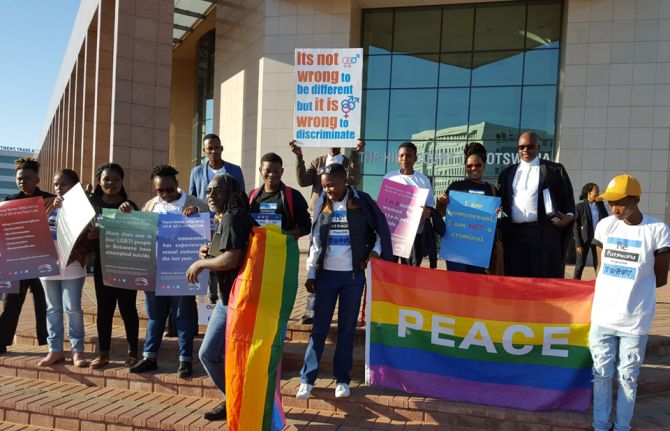
Press Statement
UNAIDS welcomes the decision of the High Court of Botswana to repeal laws that criminalize and discriminate against LGBT people
11 June 2019 11 June 2019GENEVA, 11 June 2019— UNAIDS applauds the landmark decision of the High Court of Botswana to declare unconstitutional key provisions of Sections 164 and 167 of the Botswana Penal Code. Those provisions criminalized certain private sexual acts and have led to discrimination and violence against lesbian, gay, bisexual and transgender (LGBT) people in Botswana.
“This is a historic ruling for lesbian, gay, bisexual and transgender (LGBT) people in Botswana,” said Gunilla Carlsson, UNAIDS Executive Director, a.i. “It restores privacy, respect and dignity to the country’s LGBT people, and it is a day to celebrate pride, compassion and love. I commend the activists, civil society organizations and community groups that have campaigned so hard for this moment.”
UNAIDS has been working with LGBT groups, civil society organizations and other partners to promote a more enabling legal environment in the country. In recent years, the courts in Botswana have taken a lead in protecting and promoting the human rights of marginalized groups.
Criminalization of consensual same-sex sexual relations is a violation of human rights and legitimizes stigma, discrimination and violence against LGBT people. Criminalization stops people from accessing and using HIV prevention, testing and treatment services and increases their risk of acquiring HIV.
Globally, the risk of acquiring HIV is 28 times higher among gay men and other men who have sex with men than among the general population and 13 times higher for transgender women. Prohibitive legal and policy environments and a lack of tailored services for key populations increase their vulnerability to HIV. UNAIDS urges countries to ensure the full respect of the human rights of all people, regardless of their sexual orientation, through repealing laws that prohibit sex between consenting adults in private, enforcing laws to protect people from violence and discrimination, addressing homophobia and transphobia and ensuring that crucial health services are made available.
“I hope that this decision reflects a move towards a more humane, compassionate and rights-based approach towards same-sex relations worldwide. It should encourage other countries to repeal unjust laws that criminalize same-sex sexual relations and block people’s access to essential services, including to health care,” said Ms Carlsson.
Consensual same-sex sexual relations remain criminalized in at least 67 countries and territories worldwide.
UNAIDS
The Joint United Nations Programme on HIV/AIDS (UNAIDS) leads and inspires the world to achieve its shared vision of zero new HIV infections, zero discrimination and zero AIDS-related deaths. UNAIDS unites the efforts of 11 UN organizations—UNHCR, UNICEF, WFP, UNDP, UNFPA, UNODC, UN Women, ILO, UNESCO, WHO and the World Bank—and works closely with global and national partners towards ending the AIDS epidemic by 2030 as part of the Sustainable Development Goals. Learn more at unaids.org and connect with us on Facebook, Twitter, Instagram and YouTube.

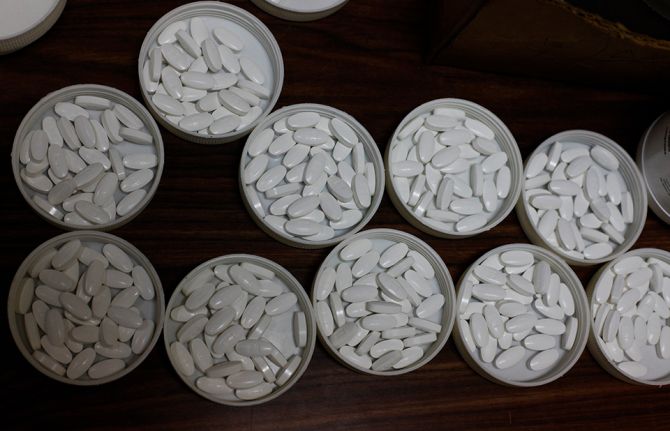
Press Statement
Interagency statement on promoting local production of medicines and other health technologies
31 May 2019 31 May 2019Low- and middle-income countries (LMICs) are becoming increasingly interested in developing the local production of quality-assured medicines and other health technologies. This is due to its potential to assist LMICs in improving access to quality-assured medicines and other health technologies, achieving universal health coverage (UHC), and reaching the health-related targets and broader developmental objectives of the Sustainable Development Goals.
The term "Local Production" can be defined in various ways. For the purposes of this statement, "local" refers to the geographical location, i.e. occurring in the country or region, and "production" — in regard to pharmaceuticals for example — refers to all activities along the pharmaceutical manufacturing value chain. Within the context of the public health agenda, promoting local production requires a holistic approach that considers policy coherence, regulatory systems strengthening, access to finance for sustainable production, a careful assessment of the business case, development of skilled human resources, access to technology for production and needs-based innovation, creation of investment incentives and other factors, to enable manufacturers to comply with international quality standards, be competitive and engage in sustainable manufacturing.
The Global Strategy and Plan of Action on Public Health Innovation and Intellectual Property, adopted at the 61st World Health Assembly (WHA) in 2008, cites local production and related transfer of technology as one of the elements to promote innovation, build capacity and improve access. More recently, at the 71st WHA in May 2018, Member States highlighted the importance of local production in the context of the global shortage of, and access to, medicines and vaccines.
A number of international organizations have also expressed their desire to source quality-assured medical products closer to the point of use. The pull effect of significant market opportunities can be a major factor in driving progress, particularly when aligned with partnerships in supporting the development of the industry and health workforce.
Strengthening local production is a cross-cutting endeavour. Sustainable local production requires effective multisectoral collaboration in order to promote enabling investment, legal and technical environments. In many LMICs, the capacity of both local manufacturers to produce and supply quality medical products and the national regulatory authority to ensure quality, efficacy and safety is insufficient. Any supply of medical products — both through local production and imports — should go hand in hand with the strengthening of regulatory capacities in order to achieve compliance with international GxP[1] and other quality standards. Close partnership between the international community and LMICs is essential to support countries and regions to build the capacities, institutions and industries that can sustain the progress made.
With the globalization of the pharmaceutical industry and the variety of country contexts, there is no "one-size fits-all" approach in promoting local production of quality-assured medicines and other health technologies. However, in recognition of the important role local production can play in improving access to quality-assured medical products and achieving UHC, the undersigned organizations aim to work in a collaborative, strategic and holistic manner in partnership with governments and other relevant stakeholders to strengthen local production. We are committed to contribute based on our respective organizations' expertise and mandate.
Launched in Geneva on 24 May 2019
Dr Tedros Adhanom Ghebreyesus, Director-General, WHO
Mr Li Yong, Director-General, UNIDO
Dr Mukhisa Kituyi, Secretary-General, UNCTAD
Ms Gunilla Carlsson, Executive Director, a.i., UNAIDS
Ms Henrietta H. Fore, Executive Director, UNICEF
Mr Peter Sands, Executive Director, The Global Fund
[1] Good manufacturing practices, good clinical practices, etc. ^
UNAIDS
The Joint United Nations Programme on HIV/AIDS (UNAIDS) leads and inspires the world to achieve its shared vision of zero new HIV infections, zero discrimination and zero AIDS-related deaths. UNAIDS unites the efforts of 11 UN organizations—UNHCR, UNICEF, WFP, UNDP, UNFPA, UNODC, UN Women, ILO, UNESCO, WHO and the World Bank—and works closely with global and national partners towards ending the AIDS epidemic by 2030 as part of the Sustainable Development Goals. Learn more at unaids.org and connect with us on Facebook, Twitter, Instagram and YouTube.

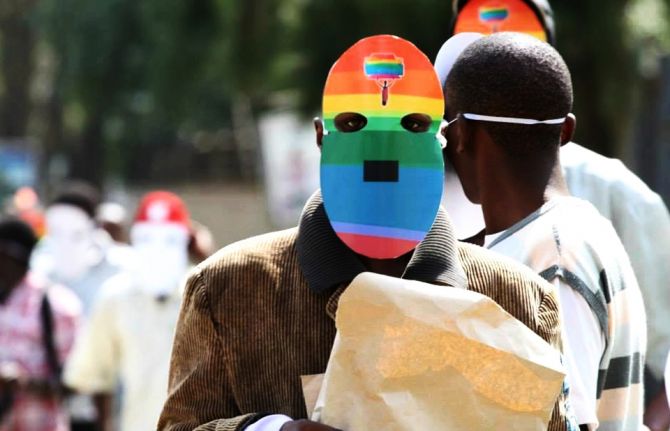
Press Statement
UNAIDS deeply regrets the decision of the High Court of Kenya to maintain laws that criminalize and discriminate against LGBT people
24 May 2019 24 May 2019GENEVA, 24 May 2019 — UNAIDS deeply regrets the decision of the High Court of Kenya to maintain key provisions of Sections 162 and 165 of the Kenyan Penal Code. Those provisions criminalize certain private sexual acts and lead to discrimination and violence against lesbian, gay, bisexual and transgender (LGBT) people in Kenya.
“Today’s ruling is a missed opportunity for Kenya to uphold human rights and to restore privacy, respect and dignity to the lesbian, gay, bisexual and transgender (LGBT) community,” said Gunilla Carlsson, UNAIDS Executive Director, a.i. “I share the deep disappointment and frustration felt by LGBT people in Kenya and I want to assure them of UNAIDS’ continued support in reaching justice and equality for all.”
UNAIDS has been working together with the National Gay and Lesbian Human Rights Coalition and other LGBT groups as well as civil society organizations and other partners to promote a more enabling legal environment in Kenya.
There are indications that the judgement will be appealed.
Criminalization of consensual same-sex sexual relations is a violation of human rights and legitimizes stigma, discrimination and violence against LGBT people. Criminalization stops people from accessing and using HIV prevention, testing and treatment services and increases their risk of acquiring HIV.
“The failure to decriminalize consensual same-sex relations will undermine Kenya’s aim of reaching universal health coverage,” said Ms Carlsson.
Globally, the risk of acquiring HIV is 28 times higher among gay men and other men who have sex with men than among the general population and 13 times higher for transgender women. Prohibitive legal and policy environments and a lack of tailored services for key populations increase their vulnerability to HIV. UNAIDS urges countries to ensure the full respect of the human rights of all people, regardless of their sexual orientation, through repealing laws that prohibit sex between consenting adults in private, enforcing laws to protect people from violence and discrimination, addressing homophobia and transphobia and ensuring that crucial health services are made available.
“We need to move towards a more humane, compassionate and rights-based approach towards same-sex relations worldwide. This decision entrenches unjust laws that criminalize same-sex sexual relations and block people’s access to essential services, including to health care,” said Ms Carlsson.
UNAIDS
The Joint United Nations Programme on HIV/AIDS (UNAIDS) leads and inspires the world to achieve its shared vision of zero new HIV infections, zero discrimination and zero AIDS-related deaths. UNAIDS unites the efforts of 11 UN organizations—UNHCR, UNICEF, WFP, UNDP, UNFPA, UNODC, UN Women, ILO, UNESCO, WHO and the World Bank—and works closely with global and national partners towards ending the AIDS epidemic by 2030 as part of the Sustainable Development Goals. Learn more at unaids.org and connect with us on Facebook, Twitter, Instagram and YouTube.

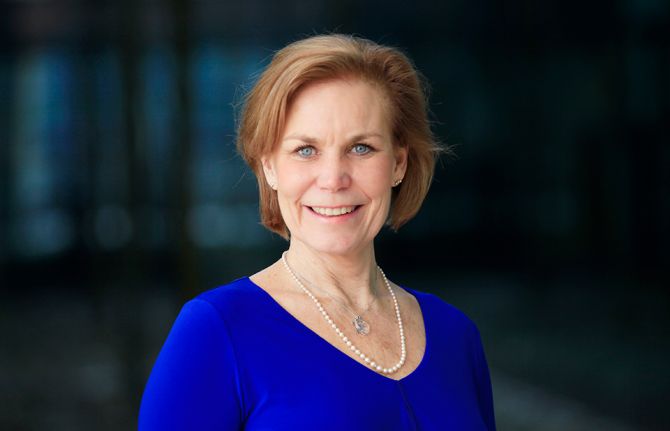
Press Statement
United Nations Secretary-General appoints Gunilla Carlsson as Executive Director, a.i., of UNAIDS
18 May 2019 18 May 2019GENEVA, 18 May 2019—UNAIDS warmly welcomes the appointment by the United Nations Secretary-General of Gunilla Carlsson as Executive Director, a.i., of UNAIDS. Ms Carlsson joined UNAIDS in February 2018 as the Deputy Executive Director for Management and Governance and Assistant Secretary-General of the United Nations.
Ms Carlsson provides strategic direction to management functions and is leading UNAIDS’ work in promoting effective governance of the Joint Programme and ensuring that UNAIDS continues to serve as a pathfinder for United Nations reform.
“It is a great honour for me to serve UNAIDS as acting Executive Director at such a pivotal time for the Joint Programme, the United Nations and global health. The AIDS response cannot afford to be at a standstill,” said Ms Carlsson. “Human rights, gender equality and diversity must be at the centre of all we do. I look forward to continuing to work hand in hand with communities, staff and partners around the globe to achieve the 2020 targets and ultimately end AIDS.”
Prior to joining UNAIDS, Ms Carlsson served as an elected member of the Swedish Parliament and as the Minister for International Development Cooperation. She also served as an elected member of the European Parliament. Ms Carlsson was the Chair of the Swedish-initiated Commission on Climate Change and Development. She was appointed by United Nations Secretary-General Ban Ki-moon to a high-level panel for global sustainability ahead of the United Nations Conference on Sustainable Development and served on the United Nations High-Level Panel on the Post-2015 Development Agenda. Ms Carlsson is an affiliated member of the board of Gavi, the Vaccine Alliance, and has served as its Vice-Chair since June 2017.
A strong leader in global health and development, Ms Carlsson has expertise in policy development on foreign policy, human rights, employment, research, security and defence. She also has extensive experience in the development and implementation of policy reforms and efficiency and accountability in complex organizations, including the private sector.
The process for the nomination of the next UNAIDS Executive Director is ongoing. The Executive Director will be appointed by the United Nations Secretary-General based on recommendations made by the Committee of Cosponsoring Organizations. A search committee established by the UNAIDS Programme Coordinating Board (PCB) and chaired by Yury Ambrazevich, Ambassador Extraordinary and Plenipotentiary Permanent Representative, Permanent Mission of Belarus to the United Nations Office and other International Organizations in Geneva, is preparing a shortlist of candidates for discussion by the PCB.
UNAIDS
The Joint United Nations Programme on HIV/AIDS (UNAIDS) leads and inspires the world to achieve its shared vision of zero new HIV infections, zero discrimination and zero AIDS-related deaths. UNAIDS unites the efforts of 11 UN organizations—UNHCR, UNICEF, WFP, UNDP, UNFPA, UNODC, UN Women, ILO, UNESCO, WHO and the World Bank—and works closely with global and national partners towards ending the AIDS epidemic by 2030 as part of the Sustainable Development Goals. Learn more at unaids.org and connect with us on Facebook, Twitter, Instagram and YouTube.
Contact
UNAIDSSophie Barton-Knott
tel. +41 22 791 1697 / +41 79 514 6896
bartonknotts@unaids.org
UNAIDS Media
tel. +41 22 791 42 37
communications@unaids.org
Biography
Press centre
Download the printable version (PDF)


Press Statement
UNAIDS calls on countries to remove discriminatory laws and enact laws that protect people from discrimination
16 May 2019 16 May 2019Discriminatory laws drive key populations out of reach of critical health and social services
GENEVA, 16 May 2019—Ahead of the International Day against Homophobia, Transphobia and Biphobia (IDAHOT), on 17 May, UNAIDS is calling on all countries to remove discriminatory laws against lesbian, gay, bisexual, transgender and intersex (LGBTI) people.
Stigma towards key populations—gay men and other men who have sex with men, sex workers, transgender people, people who inject drugs and prisoners and other incarcerated people—is reinforced by criminal laws. These in turn fuel violence, exploitation and a climate of fear, hindering efforts to make HIV services available to the people who need them.
“We all have a moral and legal obligation to remove discriminatory laws and enact laws that protect people from discrimination,” said Gunilla Carlsson, UNAIDS Executive Director, a.i. “To end the AIDS epidemic, people need to be protected from harm. We need justice and equality for all.”
More than 65 countries criminalize same-sex sexual relations, including at least eight that impose the death penalty. Globally, gay men and other men who have sex with men are around 28 times more likely to acquire HIV than the general population and are much less likely to access HIV services. In 2017, gay men and other men who have sex with men accounted for 18% of new HIV infections worldwide.
“It is critically important that we create a world where all people can access the health and social services they need without the threat of violence and discrimination. Universal health coverage means reaching all people―sexual and gender minorities have the same right to health as everyone else,” said Tedros Adhanom Ghebreyesus, Director-General of the World Health Organization.
Transgender people, who account for an estimated 0.1–1.1% of the global population, often face stigma, discrimination and social rejection in their homes and communities. Discrimination, violence and criminalization prevent transgender people from accessing the HIV services they need to stay healthy. It is estimated that transgender women are 13 times more likely to acquire HIV than other adults of reproductive age and that 16.5% of transgender women are living with HIV.
“Justice and protection for all are central to driving progress on the 2030 Agenda for Sustainable Development and the Sustainable Development Goals. Enacting and enforcing non-discriminatory laws and policies, repealing punitive laws and ensuring access to justice for all are critical to delivering on the commitment to leave no one behind,” said Achim Steiner, Administrator of the United Nations Development Programme.
UNAIDS joins with the United Nations Secretary-General and the United Nations High Commissioner for Human Rights in calling for the decriminalization of LGBTI people and for LGBTI people to be protected from violence and discrimination and to have full access to health and other social services.
IDAHOT, a worldwide celebration of sexual and gender diversity, is commemorated annually on 17 May.
UNAIDS
The Joint United Nations Programme on HIV/AIDS (UNAIDS) leads and inspires the world to achieve its shared vision of zero new HIV infections, zero discrimination and zero AIDS-related deaths. UNAIDS unites the efforts of 11 UN organizations—UNHCR, UNICEF, WFP, UNDP, UNFPA, UNODC, UN Women, ILO, UNESCO, WHO and the World Bank—and works closely with global and national partners towards ending the AIDS epidemic by 2030 as part of the Sustainable Development Goals. Learn more at unaids.org and connect with us on Facebook, Twitter, Instagram and YouTube.
Press centre
Download the printable version (PDF)

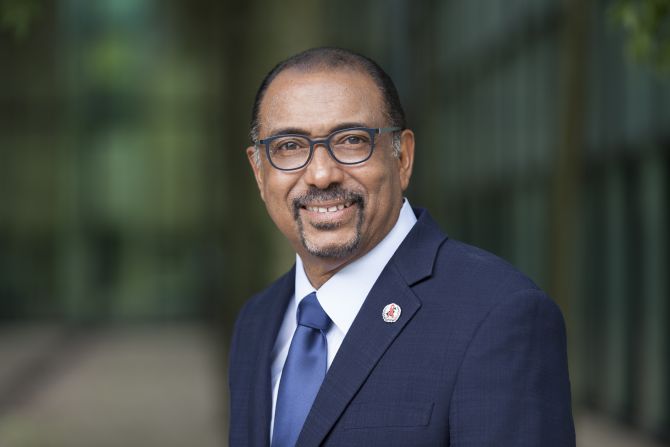
Press Statement
UNAIDS congratulates Michel Sidibé on his appointment as Minister of Health and Social Affairs of Mali
08 May 2019 08 May 2019UNAIDS extends its heartfelt thanks to the Executive Director of UNAIDS for his outstanding contribution to the global response to HIV
GENEVA, 8 May 2019—UNAIDS congratulates Michel Sidibé on his appointment as the Minister of Health and Social Affairs of Mali. Mr Sidibé served as the Executive Director of UNAIDS for more than 10 years after being appointed as the second Executive Director of UNAIDS and Under-Secretary-General of the United Nations in January 2009.
A true champion for a people-centred approach to health and development and a strong advocate for social justice, Mr Sidibé has made a remarkable contribution to the AIDS response, helping to save and improve the lives of millions of people around the world.
Since Mr Sidibé took up his position as Executive Director of UNAIDS, there has been a 170% increase in the number of people accessing antiretroviral therapy, from 8 million in 2010 to 21.7 million in 2017. There has also been a 45% drop in AIDS-related deaths—from 1.7 million in 2008 to 940 000 in 2017—and new HIV infections have been reduced by 22%—from 2.3 million in 2008 to 1.8 million in 2017.
“It has been an honour for me to serve UNAIDS as its Executive Director and contribute to the global AIDS response,” said Mr Sidibé. “I would like to thank all UNAIDS partners and staff and especially community members affected by HIV, who have made our successes possible. With their steadfast commitment and resolve, we have been able to bring life-saving services to millions of people. If we stay the course and do the right thing, always—putting people first and delivering results for people—we will succeed in ending AIDS.”
Mr Sidibé’s vision of zero new HIV infections, zero discrimination and zero AIDS-related deaths, and his tireless advocacy to ensure that all people have access to health services, have kept HIV at the top of the global agenda. His calls for global solidarity and shared responsibility have seen resources for HIV increase by more than one third, from US$ 15.9 billion in 2010 to US$ 20.6 billion in 2017 in low- and middle-income countries. His advocacy for country ownership helped to ensure that 56% of HIV resources in low- and middle-income countries now come from domestic sources, promoting long-term sustainable responses to HIV.
His commitment to the concept of universal access to HIV prevention, treatment, care and support meant that the goal of reaching 15 million people living with HIV with antiretroviral therapy by 2015 was achieved seven months ahead of schedule. His focus on the most vulnerable and marginalized has given a voice to the voiceless, including gay men and other men who have sex with men, sex workers, transgender people, people who inject drugs, prisoners and other incarcerated people, and people on the move.
A strong believer that no child should be born with HIV, his leadership in calling for the elimination of new HIV infections among children contributed to a 60% reduction in new paediatric HIV infections since 2009 in the 21 priority countries of the Global Plan towards the elimination of new HIV infections among children by 2015 and keeping their mothers alive.
During his tenure, Mr Sidibé spearheaded two of the most successful United Nations General Assembly political declarations on HIV, which named key populations and included ambitious regional and global Fast-Track Targets. He has successfully advocated to take AIDS out of isolation, encouraging a holistic human-rights based approach to include HIV as part of sexual and reproductive health and integrate responses to interlinked diseases, including tuberculosis and cervical cancer.
“I would like to thank United Nations Secretary-General António Guterres for his long-standing support to UNAIDS,” said Mr Sidibé. “I am also grateful to the United Nations system for allowing me to develop my career, from when I started as a short-term junior professional in the Democratic Republic of the Congo for the United Nations Children’s Fund in 1987 to becoming Under-Secretary-General of the United Nations some 20 years later—I am eternally thankful for the opportunities I have been given.”
The countries most affected by HIV have rallied behind Mr Sidibé’s call to reach the 90–90–90 targets, whereby 90% of people living with HIV know their status, 90% of people who know their status are accessing treatment and 90% of people on treatment have a suppressed viral load. Some 75% of all people living with HIV now know their HIV status, and focus has been increased on HIV testing and expanding antiretroviral therapy.
His call with partners to establish an HIV prevention coalition led to a new HIV Prevention 2020 Road Map to strengthen and sustain political commitment for primary HIV prevention and establish accountability for delivering services at scale in order to stop new HIV infections.
His commitment to improving the lives of women and girls galvanized action for Security Council resolution 1983 in 2011, which focused on ensuring access to HIV prevention and treatment for women and girls, on the prevention of, and response to, sexual violence related to conflict and on post-conflict peacebuilding.
Mr Sidibé’s strong belief in the power of communities has paved the way for community-led responses to HIV, which have proved to be a gamechanger in increasing the uptake of HIV services and in creating support networks to improve adherence to treatment and quality of life for people living with HIV.
His undeterred commitment, dedication and passion has allowed Mr Sidibé to engage heads of state, people living with HIV, affected communities, donors, first ladies, parliamentarians, Mayors, civil society, scientists, young people and HIV programme leaders alike, bringing everyone around the same table to galvanize action to end AIDS by developing focused and sustainable solutions that leave no one behind.
Mr Sidibé has been an inspirational leader of UNAIDS and for the global response to HIV, and UNAIDS extends its heartfelt thanks for his years of dedicated service. Mr Sidibé will take on his new role as Minister of Health and Social Affairs of Mali with immediate effect and will be replaced ad interim by UNAIDS Deputy Executive Director, Management and Governance, Gunilla Carlsson.
UNAIDS
The Joint United Nations Programme on HIV/AIDS (UNAIDS) leads and inspires the world to achieve its shared vision of zero new HIV infections, zero discrimination and zero AIDS-related deaths. UNAIDS unites the efforts of 11 UN organizations—UNHCR, UNICEF, WFP, UNDP, UNFPA, UNODC, UN Women, ILO, UNESCO, WHO and the World Bank—and works closely with global and national partners towards ending the AIDS epidemic by 2030 as part of the Sustainable Development Goals. Learn more at unaids.org and connect with us on Facebook, Twitter, Instagram and YouTube.
Contact
Sophie Barton-Knotttel. +41 22 791 1697 / +41 79 514 6896
bartonknotts@unaids.org
UNAIDS Media
tel. +41 22 791 42 37
communications@unaids.org
Press centre
Download the printable version (PDF)
Region/country


Press Statement
UNAIDS welcomes additional evidence that effective antiretroviral therapy stops transmission of HIV
03 May 2019 03 May 2019Results from a large-scale European study among serodiscordant gay couples show that adherence to effective treatment prevents transmission of HIV
GENEVA, 3 May 2019—UNAIDS warmly welcomes the PARTNER2 study results that show that HIV transmission does not occur when a person living with HIV is on effective antiretroviral therapy. The study, which enrolled nearly 1000 gay couples in which one partner was living with HIV and the other was not, showed that where the person living with HIV was taking effective antiretroviral therapy and had a suppressed viral load, there was no HIV transmission within the couple.
“This is excellent news. People living with HIV now have confirmation that provided they take treatment regularly and are virally suppressed, they are not infectious,” said Michel Sidibé, Executive Director of UNAIDS. “This gives a strong, positive message that will help to reduce the stigma around HIV and improve the self-esteem and self-confidence of people living with HIV.”
By the end of the eight-year study, 15 people did become infected with HIV. Virus screening showed that none of the new infections were linked to the HIV-positive partners in the study, but came from a sexual partner outside of the couple. The researchers estimate that within the study, which took place across 14 European countries, around 472 HIV transmissions were averted over the eight years.
UNAIDS hopes that the results will encourage more people to get tested early and take effective treatment. In recent years there has been a huge scale-up in the roll-out and uptake of antiretroviral therapy. In 2017, of the 36.9 million people living with HIV, 59% (21.7 million) had access to treatment and 47% were virally suppressed. Concerted efforts are needed to ensure that all people living with HIV have access to and adhere to effective antiretroviral therapy.
A large proportion of HIV transmission still occurs before people know their HIV status. The risk of HIV transmission is highest in the weeks and months immediately after infection, when the viral load is high and the person who has contracted the virus is unlikely to know their status, is not on treatment and is not virally suppressed. This demonstrates the critical importance of continuing HIV prevention efforts, including condom use and pre-exposure prophylaxis—medicine taken by an HIV-negative person to prevent HIV.
UNAIDS
The Joint United Nations Programme on HIV/AIDS (UNAIDS) leads and inspires the world to achieve its shared vision of zero new HIV infections, zero discrimination and zero AIDS-related deaths. UNAIDS unites the efforts of 11 UN organizations—UNHCR, UNICEF, WFP, UNDP, UNFPA, UNODC, UN Women, ILO, UNESCO, WHO and the World Bank—and works closely with global and national partners towards ending the AIDS epidemic by 2030 as part of the Sustainable Development Goals. Learn more at unaids.org and connect with us on Facebook, Twitter, Instagram and YouTube.
Contact
Sophie Barton-Knotttel. +41 22 791 1697 / +41 79 514 6896
bartonknotts@unaids.org
UNAIDS Media
tel. +41 22 791 42 37
communications@unaids.org
Press centre
Download the printable version (PDF)
